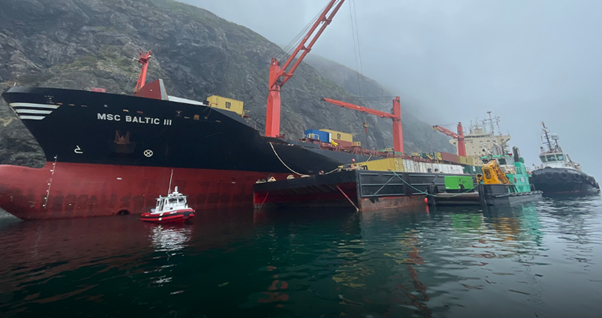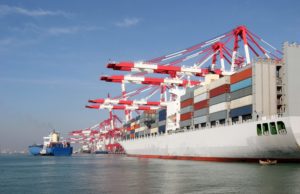The Canadian Coast Guard continues to monitor the grounded cargo vessel MSC Baltic III as the fuel removal remains now the priority. The Liberia-flagged containership MSC Baltic III, which lost power and ran aground in Wild Cove west of Lark Harbour on February 15, has been the focus of a long effort to remove the fuel and cargo, with the whole operation facing significant challenges as the bad weather had been a factor during the winter.
The Canadian Coast Guard (CCG) has confirmed on Wednesday that the heavy fuel from six of the main priority tanks onboard the MSC Baltic III has been removed and transferred to other MSC vessels. This represents approximately 85% of the heavy fuel.
The vessel EEMS Dublin remains in the area to facilitate the transfer of personnel and containers. An additional 36 cargo containers have been removed from the MSC Baltic III. Currently, 208 of the 472 containers onboard the grounded vessel have been removed.
The Canadian Coast Guard highlights in its latest update on July 9 that fuel removal remains the priority and the focus is now on oil removal from the engine room and smaller tanks onboard the vessel.
As it is reported, on water and shoreline surveys continue. Minor oil observations, such as tar stains and small tar balls, continue to be recorded in Cedar Cove and nearby shorelines.
The Coast Guard reminded to the public Wednesday that a one-nautical-mile emergency and drone restriction zone remains in place to ensure the safety of responders in the area and the public. “We are noticing increased activity in the area of the grounded vessel. We would like to remind the public of the emergency and drone restriction zone that is in place one nautical mile around the cargo ship to account for the salvage contractors’ current operational footprint.”
On Saturday morning, February 15, the marine communications and traffic services in Port aux Basques received a MAYDAY from the cargo ship MSC Baltic III located approximately 12 nautical miles outside the entrance to Bay of Islands, NL.
At that time, the ship reported a loss of power. Weather and sea conditions in the area were not in the crew’s favour, with the vessel being unable to secure an anchor.
The 20 crew members onboard were successfully airlifted from the vessel by a Cormorant helicopter.
Progress continues in the response to the MSC Baltic III. As of now, about 85% of the heavy fuel and 208 of the 472 containers on board have been removed from the ship. Fuel removal remains the top priority, with efforts shifting to oil in the engine room and smaller tanks. pic.twitter.com/k7nSbh16N5
— Canadian Coast Guard (@CoastGuardCAN) July 9, 2025



